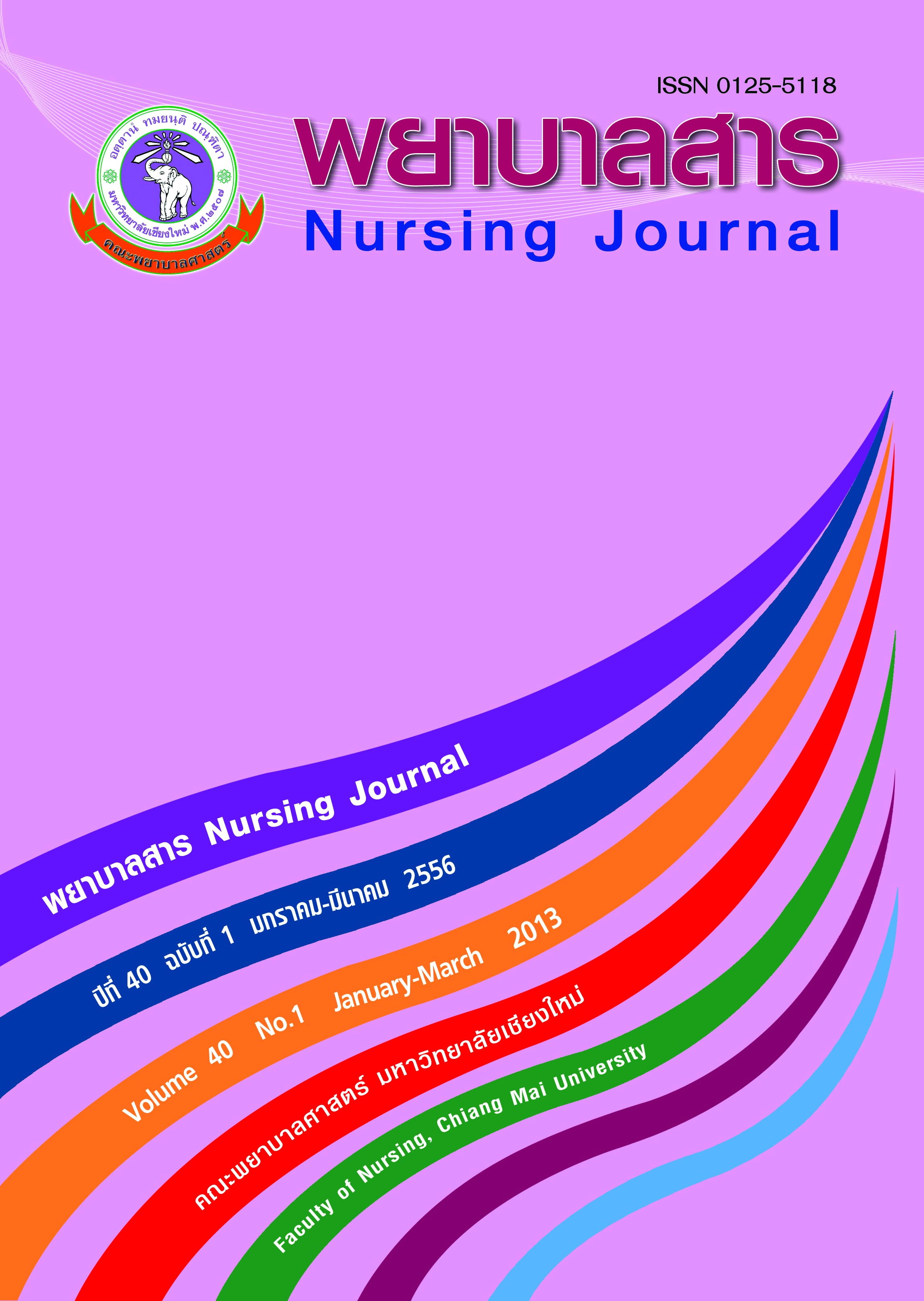ผลของโปรแกรมการฝึกการจัดการตนเองต่อความเหนื่อยล้าและความผาสุกขอผู้ป่วยมะเร็งปากมดลูกที่ได้รับรังสีรักษา
Keywords:
มะเร็งปากมดลูก, การฝึกการจัดการตนเอง, ความเหนื่อยล้า, ความผาสุก, รังสีรักษา, Cervical Cancer, Self-management Training, Fatigue, Well-beingAbstract
บทคัดย่อ
ความเหนื่อยล้า เป็นปัญหาสำคัญที่สุดที่พบในคนไทยที่เป็นมะเร็งปากมดลูกและได้รับรังสีรักษาการวิจัยเชิงทดลองครั้งนี้เพื่อศึกษาผลของโปรแกรมการฝึกการจัดการตนเองต่อความเหนื่อยล้าและความผาสุกของผู้ป่วยมะเร็งปากมดลูกที่ได้รับรังสีรักษา กลุ่มตัวอย่างเป็นผู้ป่วยมะเร็งปากมดลูกในระยะที่ 2หรือระยะที่ 3 ที่มารับรังสีรักษา ณ ศูนย์มหาวชิรลงกรณ ธัญบุรี จังหวัดปทุมธานีและศูนย์มะเร็ง จังหวัดลพบุรี สุ่มกลุ่มตัวอย่างโดยวิธีการสุ่มอย่างง่าย ได้กลุ่มทดลอง 32 ราย กลุ่มควบคุม 30 ราย กลุ่มทดลองได้รับโปรแกรมการฝึกการจัดการตนเองที่พัฒนาจากแนวคิดการจัดการตนเองของเครียร์ ซึ่งประกอบด้วยการให้ความรู้เป็นกลุ่มย่อยและคู่มือการจัดการตนเอง การฝึกทักษะการจัดการตนเองเพื่อลดความเหนื่อยล้าโดยครอบคลุมเรื่องโภชนาการ การเต้นรำเต้าเต๋อซิ่นซี การส่งเสริมการนอนหลับ การอภิปรายกลุ่มย่อยเพื่อสะท้อนตนเอง การให้คำปรึกษารายบุคคลและการติดตามเยี่ยมทางโทรศัพท์ กลุ่มควบคุมได้รับการพยาบาลตามปกติ เก็บรวบรวมข้อมูลโดยแบบประเมินความเหนื่อยล้าและแบบประเมินความผาสุกที่ผ่านการตรวจสอบคุณภาพ วิเคราะห์ข้อมูลด้วยสถิติเชิงพรรณนา ไคสแคว์ สถิติที และการวิเคราะห์ความแปรปรวนร่วม
ผลการศึกษา พบว่า
หลังเข้าร่วมโปรแกรม 5 สัปดาห์ กลุ่มทดลองมีคะแนนความเหนื่อยล้าตํ่ากว่ากลุ่มควบคุมอย่างมีนัยสำคัญ (p<0.001) และมีคะแนนความผาสุกสูงกว่ากลุ่มควบคุมอย่างมีนัยสำคัญทางสถิติ (p<0.001) ผลการศึกษาครั้งนี้แสดงให้เห็นประสิทธิผลของโปรแกรมการฝึกการจัดการตนเองในการลดความเหนื่อยล้าและเพิ่มความผาสุกในผู้ป่วยมะเร็งปากมดลูกที่ได้รับรังสีรักษา ทั้งนี้ควรศึกษาซํ้าโดยติดตามผลในระยะยาวและควรติดตามการเปลี่ยนแปลงของความเหนื่อยล้าเป็นระยะ
คำสำคัญ: มะเร็งปากมดลูก การฝึกการจัดการตนเอง ความเหนื่อยล้า ความผาสุก รังสีรักษา
Abstract
Fatigue is the most importance common problems among Thai cervical cancer patientsreceiving radiotherapy. The aim of this experimental study was to determine the effects of aself-management training program on fatigue and well-being among cervical cancer patientsreceiving radiotherapy. The samples were stage 2 or stage 3 cervical cancer patients whocame for radiation therapy at the Mahavajiralongkorn Cancer Center, Pathumthani provinceand the Lopburi Cancer Center, Lopburi province. They were randomly assigned into twogroups, including 32 patients in experimental group, and 30 patients in the control group. Theexperiment group received a self-management training program, which was developed basedon the self- management concept (Creer, 2000). The program’s content included a small grouphealth-education session and a patient’s manual, self-management skill training for fatiguemanagement, regarding meal planning,“Daodexinxi”, an exercise training session, sleep support,a small group discussion for self-reflection, an individual counseling session, a phone-visit session.The control group received the usual nursing care. Data were collected using the fatigueand well-being questionnaires that were tested for psychometric properties. Data were analyzedusing Descriptive statistics, Chi-square test, Independent T-test, and Analysis of co-variance.
The results of study
At 5 - week after enrollment, the experimental group demonstrated a significantly lowerfatigue scores (p<0.001), and showed significantly higher well-being scores than the controlgroup (p<0.001). The results from this study indicated that the self-management training programis effective in decreasing fatigue and increasing well-being in cervical cancer patients receivingradiotherapy. The further studies should be replicated in a long-term period and should userepeated measures for determining changes in fatigue.
Key words: Cervical Cancer, Self-management Training, Fatigue, Well-being
Downloads
How to Cite
Issue
Section
License
บทความที่ได้รับการตีพิมพ์เป็นลิขสิทธิ์ของวารสารพยาบาลสาร
ข้อความที่ปรากฏในบทความแต่ละเรื่องในวารสารวิชาการเล่มนี้เป็นความคิดเห็นส่วนตัวของผู้เขียนแต่ละท่านไม่เกี่ยวข้องกับมหาวิทยาลัยเชียงใหม่ และคณาจารย์ท่านอื่นๆในมหาวิทยาลัยฯ แต่อย่างใด ความรับผิดชอบองค์ประกอบทั้งหมดของบทความแต่ละเรื่องเป็นของผู้เขียนแต่ละท่าน หากมีความผิดพลาดใด ๆ ผู้เขียนแต่ละท่านจะรับผิดชอบบทความของตนเองแต่ผู้เดียว






